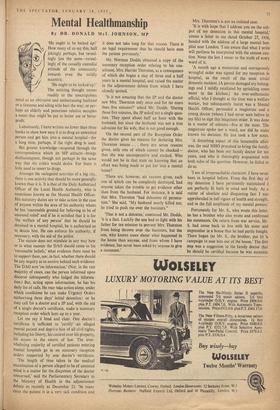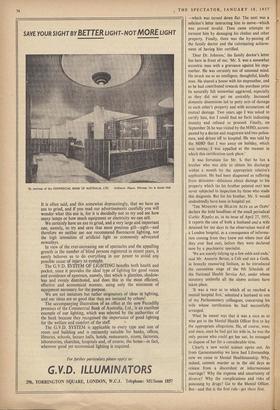Mental Healthmanship
By DR. DONALD Mel. JOHNSON, MP 'He ought to be locked up!' How many of us say this, half jokingly perhaps, but reveal- ingly just the same—reveal- ingly of the casually custodial attitude of the community towards even the mildly eccentric.
'He ought to be locked up!' The enticing thought comes readily to the unscrupulous mind as an obtrusive and embarrassing husband or a tiresome and ailing wife bars the way; or per- haps an elderly and penurious relative occupies a room that might 'be put to better use or better profit.
Laboriously, I have-written no fewer than three books to show how easy it is to drug an unwanted person and get him into a mental hospital—for a long time, perhaps, if the right drug is used.
But greater knowledge—acquired through the correspondence which an MP attracts—brings disillusimmient, though not perhaps in the same way that my critics would desire. For there is little need to resort to drugs.
Amongst the variegated activities of a big city, there is one activity that should be more generally known than it is. It is that of the Duly Authorised Officer of the Local Health Authority, who is sometimes known as the Mental Health Officer. His statutory duties are to take action in the case of anyone within the area of his authority whom he has 'reasonable ground for believing to be of unsound mind' and if he is satisfied that it is for 'the welfare of any person' that he should be detained in a mental hospital, he is authorised so to detain him. He can enforce his authority, if necessary, with the aid of the police.
The statute does not stipulate in any way how or in what manner the DA0 should come to his 'reasonable beliefs,' what evidence there must be to support them, nor, in fact, whether there should be any inquiry as to motive behind such evidence. The DAO acts 'on information.' (Nor, in the vast majority of cases, can the person informed upon discover subsequently who lodged the informa- tion.) But, acting upon information, he has his daily list of calls. He may take action alone, under Which conditions he can make Urgency Orders authorising three days' initial detention: or he may call for a doctor and a JP and, with the aid of a single doctor's certificate, make a summary reception order which lasts up to a year.
Let me say it loud and clear. One doctor's certificate is Xufficient to 'certify' .an alleged mental patient and deprive him of all civil rights, including his liberty, his control over his property, his access to the courts of law. The over- whelming majority of certified patients entering mental hospitals go in on summary reception orders supported by one doctor's certificate.
'The length of time taken in the medical examination of a person alleged to be of unsound mind is a matter for the discretion of the doctor concerned,' said the Parliamentary Secretary to the Ministry of Health in the adjournment debate as recently as December 21. 'In many cases the patient is in a very sick condition and it does not take long for that reason. There is no legal requirement that he should have seen the patient previously.'
Mr. Norman Dodds obtained a copy of the summary reception order relating to his con- stituent, Mrs. Harriet Thornton, as a consequence of which she began a stay of three and a half years in a mental hospital, and raised the matter in the adjournment debate from which I have already quoted. - 'Is it not amazing that the JP and the doctor saw Mrs. Thornton only once and for no more than five minutes?' asked Mr. Dodds. 'During those five minutes, the JP asked not a single ques- tion. They spent about half an hour with the husband, but since the husband was not a true advocate for his wife, that is not good enough.
'On the second part of the Reception Order the doctor gives his reasons for declaring Mrs. Thornton insane . . . there are seven reasons given, only one of which cannot be checked— that she was uncooperative and excited. Who would not be in that state on knowing that an effort was being made to put her into a mental home?
'There are, however, six reasons given, each one of which can be completely destroyed, had anyone taken the trouble to get evidence other than from the husband. For instance, it is said that Mrs. Thornton "had delusions of persecu- tion." She said, "My husband nearly killed me; he tried to push me over the banisters."
'That is not a delusion,' continued Mr. Dodds, 'it is a fact. Luckily the son had to fight with his father for ten minutes to prevent Mrs. Thornton from being thrown over the banisters, but the son, who knows more about what happened in the house than anyone, and from whom I have evidence, has never been asked by anyone to give a statement.' Mrs. Thornton's is not an isolated case.
'It is with hope that I address you on the sub- ject of my detention in this mental hospital,' comes a letter to me dated October 27, 1956, headed with the address of a large mental hos- pital near London. 'I am aware that what I write will perforce be interpreted with the utmost cau- tion. None the less I swear to the truth of every word of it.
'A month ago a monstrous and outrageously wrongful order was signed for my reception in hospital, as the result of the most trivial domestic incident. (A person damaged my belong- ings and I mildly retaliated by sprinkling some water in the kitchen.) An over-enthusiastic official, who Lthought at the time was a welfare worker, but subsequently learnt was a Mental Health Officer, persuaded a magistrate and a young doctor (whom I had never seen before in my life) to sign this iniquitous order. It was done in a matter of minutes—five at the most. The magistrate spoke not a word, nor did he make known his decision. He just took a few notes.
'A disturbing aspect of this lamentable affair was, the said MHO promised to bring the family doctor, who has been our family doctor for ten years, and who is thoroughly acquainted with both sides of the question. However, he failed to do so.
'I am of irreproachable character. I have never been in hospital before. From the first day of my detention I have persistently maintained I am perfectly fit both in mind and body. As a matter of absolute and disquieting fact I was apprehended in full vigour of health and strength, and in the full amplitude of my mental powers.'
Fortunately for Mr. S., who wrote this letter. he has a brother who also wrote and confirmed his statements. On return from war service, Mr. S. had come back to live with his sister and stepmother in a house that he had partly bought. There began (as Mr. S., the brother, put it) 'a campaign to ease him out of the house.' The first step was a suggestion to the family doctor that he should be certified because he was eccentric —which was turned down flat. The next was a solicitor's letter instructing him to move—which was proved invalid. Then came attempts to torment him by damaging his clothes and other property. Finally, there was the by-passing of the family doctor and the culminating achieve- ment of having him certified.
'Dear Dr. Johnson,' the family doctor's letter lies here in front of me; `Mr. S. was a somewhat eccentric man with a grievance against his step- mother. He was certainly not of unsound mind. He struck me as an intelligent, thoughtful, kindly man. He shared a house with his stepmother, and as he had contributed towards the purchase price he naturally felt somewhat aggrieved, especially as they did not get on amicably. Increased domestic dissensions led to petty acts of damage to each other's property and with accusations of mutual damage. Two years ago I was asked to certify him, but I could find no facts indicating insanity and refused to proceed. Finally, on September 26 he was visited by the MHO, accom- panied by a doctor and magistrate and two police- men, and driven off to hospital. He was told by the MHO that I was away on holiday, which was untrue. I was appalled at the manner in which this certification took place.'
It was fortunate for Mr. S. that he has a brother who was able to obtain his discharge within a month by the appropriate relative's application. He had been diagnosed as suffering from delusions—delusions about damage to his property which (as his brother pointed out) was never subjected to inspection by those who made this diagnosis. But for his brother, Mr. S. would undoubtedly have been in hospital yet.
'THE MINISTRY OF HEALTH ACTS AS AN OGPV declare the bold headlines of the small periodical Gothic Ripples as, in its issue of April 27, 1955, it reports the case of both a husband and a wife detained for ten days in the observation ward of a London hospital, as a consequence of informa- tion coming from they knew not where (nor did they ever find out), before they were declared sane by a psychiatric specialist.
'We are merely tidying up a few odds and ends,' said Mr. Aneurin Bevan, a Celt and not a Goth, in breezily reassuring fashion, as he introduced the committee stage of the 9th Schedule of the National Health Service Act, under whose statutory umbrella all the above actions have taken place.
it was a race as to which of us reached a mental hospital first,' admitted a husband to one of my Parliamentary colleagues, concerning his wife whose certification he had successfully arranged.
What he meant was that it was a race as to who got to the Mental Health Officer first to lay the appropriate allegations. He, of course, won; and since, once he had got his wife in, he was the only person who could get her out, he managed to dispose of her for a considerable time.
Clearly a new social science opens out. As from Gamesmanship we have had Lifemanship, now we come to Mental Healthmanship. Why, indeed, commit murder as in the old days as release from a discordant or inharmonious marriage? Why the expense and uncertainty of divorce? Why the complications and risks of poisoning by drugs? Go to the Mental Officer. But—and this is the first rule—get there first.



































 Previous page
Previous page